#st. andrew of crete
Explore tagged Tumblr posts
Text
Have mercy on me, O God, have mercy on me!
O venerable mother Mary, pray to God for us!
O venerable father Andrew, pray to God for us!
Glory to the Father and to the Son and to the Holy Spirit,
Now and ever and to the ages of ages. Amen.
#the great canon of St. Andrew of Crete#lent#orthodoxy#orthodox christianity#mary of egypt#andrew of crete#great lent
3 notes
·
View notes
Text
One Minute Reflection – 8 June – ' ... the perfect model, worthy of God ... '
One Minute Reflection – 8 June – The Queenship of the Blessed Virgin Mary – Ecclesiasticus 24:5; 14:7; 14:9-11; 24:30-31; Luke 1:26-33 – Scripture search here: https://www.drbo.org/ “Hail, full of grace!”– Luke 1:28 REFLECTION – “The degeneration caused by sin had obscured the beauty of our original nobility. But when the mother of supreme Beauty is born, our nature finds its purity once more…

View On WordPress
#catholic#luke 1:26-33#luke 1:28#roman catholic#sacred heart#st andrew of crete#The INCARNATION#the queenship of mary
4 notes
·
View notes
Text
SAINT OF THE DAY (July 4)
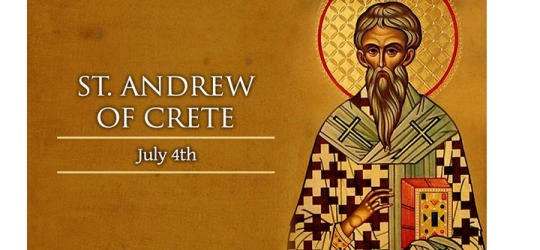
Celebrated by Eastern Catholics of the Byzantine tradition on July 4, Saint Andrew of Crete was a seventh and eighth-century monk, bishop, and hymn-writer.
Among Eastern Christians, he is best known as the author of the “Great Canon,” a lengthy prayer service traditionally offered as a penitential practice during Lent.
He is also venerated as a saint in the Roman Catholic Church, where he is better known for his writings on the Blessed Virgin Mary.
He should not be confused with a different “Saint Andrew of Crete,” celebrated on October 17, who suffered martyrdom while defending the veneration of icons during the eighth century.
The author of the “Great Canon” was born in the Syrian city of Damascus in the mid-seventh century.
He is said to have remained mute for the first seven years of his life, gaining the power of speech at age seven after the reception of Holy Communion.
Devoted to God from that time on, Andrew went to Jerusalem and entered the Monastery of Saint Sava when he was 15 years old.
He went on to serve as a cleric of the Jerusalem Patriarchate and was sent as a representative to the Sixth Ecumenical Council in Constantinople (680-681).
The council took up the monothelite controversy, a disagreement as to whether Christ had both a divine and a human will (as the Church teaches), or only a divine will.
Though the question may seem abstract to modern ears, it was an important point, bearing on the reality of Jesus' full humanity.
In 685, Andrew returned to Constantinople, where he did charitable work for orphans and the poor, and served as a deacon in the great Hagia Sophia church.
Around the year 700, he became archbishop of the city of Gortyna, on the island of Crete.
In 712, during a resurgence of the monothelite heresy, Andrew was forced to attend an illegitimate gathering in which the Byzantine emperor, Philippicus Bardanes, tried to reverse the decisions of the Sixth Council.
Andrew's coerced attendance was questioned but forgiven by the reigning Pope Constantine.
Little is known about the rest of the archbishop's life, which ended peacefully, probably in 740.
While his participation in the historic Sixth Council is important, St. Andrew of Crete’s legacy has more to do with his outstanding sermons and liturgical hymns, reflective of a deep interior life of faith.
The Great Canon, his most ambitious known work, takes around three hours to chant.
It incorporates more than 200 full-body prostrations along with its many litanies, odes, and refrains.
Surveying the Old and New Testaments, it stresses the urgency of repentance and conversion.
The service begins:
“Where shall I begin to lament the deeds of my wretched life? What first-fruit shall I offer, O Christ, for my present lamentation? But in Thy compassion grant me release from my falls.
Come, wretched soul, with your flesh, confess to the Creator of all. In future refrain from your former brutishness, and offer to God tears in repentance.”
Interspersed throughout, is the Great Canon’s defining plea: “Have mercy on me, O God, have mercy on me!”
6 notes
·
View notes
Text



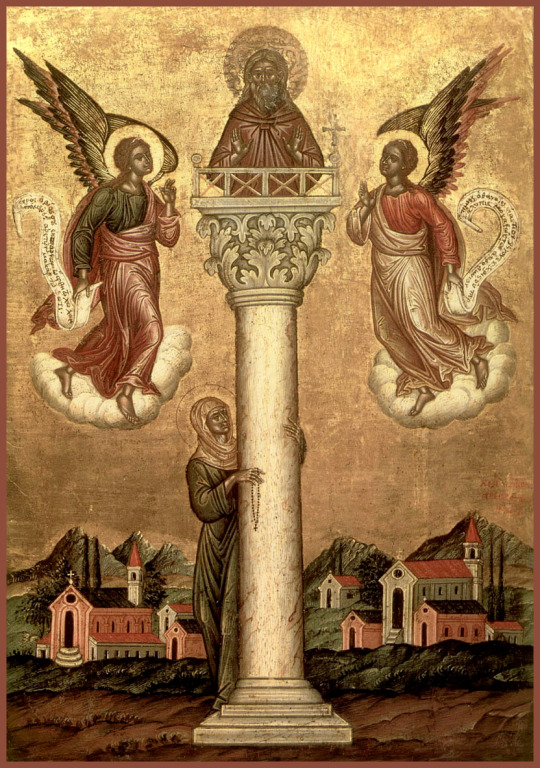
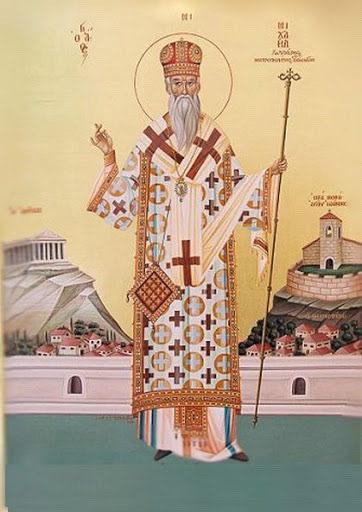

Daily Scripture Readings and Lives of the Saints for Friday, July 04, 2025
Strict Fast
Feasts and Saints celebrated today:
Andrew of Crete Author of the Great Canon
Martha, mother of St. Symeon Stylites the Younger
Asclepias the Wonderworker
Michael Choniates, Metropolitan of Athens
Readings for today:
St. Paul's Letter to the Romans 11:25-36
Matthew 12:1-8
Andrew of Crete Author of the Great Canon
Reading from the Synaxarion:
Saint Andrew was from Damascus; his parents' names were George and Gregoria. He became a cleric and secretary of Theodore and Patriarch of Jerusalem; from this, he is called "the Jerusalemite." He was present at the Sixth Ecumenical Council in Constantinople, which was convoked in 680 during the reign of Emperor Constantine IV (668-685). He became deacon of the Great church in Constantinople, that is, the Church of the Holy Wisdom of God, then Archbishop of Crete. He reposed in 720 or 723. Beside his other sacred writings, he also composed various hymns, among which is the famous Great Canon, which is chanted during Great Lent (see the Thursday of the Fifth Week of the Fast).
Apolytikion of Andrew the Hymnographer in the Fourth Tone
A model of faith and the image of gentleness, the example of your life has shown you forth to your sheep-fold to be a master of temperance. You obtained thus through being lowly, gifts from on high, and riches through poverty. Andrew, our father and priest of priests, intercede with Christ our God that He may save our souls.
Kontakion of Andrew the Hymnographer in the Second Tone
While trumpeting forth the songs of God with clarity, thou also didst prove a blazing light for all the world, O most righteous Andrew, who shonest with the light of the Trinity. Wherefore, we all cry out to thee: Cease not to entreat the Master for us all.
The content on this page is under copyright and is used by permission. All rights reserved. These works may not be further reproduced, in print or on other websites or in any other form, without the prior written authorization of the copyright holder:
Reading (c) Holy Transfiguration Monastery - Brookline, MA
Apolytikion of Andrew the Hymnographer (c) Narthex Press
Kontakion of Andrew the Hymnographer (c) Holy Transfiguration Monastery, Brookline, MA
Prayer Before Reading Scripture
Shine within our hearts, loving Master, the pure light of Your divine knowledge and open the eyes of our minds that we may comprehend the message of Your Gospel. Instill in us also reverence for Your blessed commandments, so that having conquered all sinful desires, we may pursue a spiritual life, thinking and doing all those things that are pleasing to You. For You, Christ our God, are the light of our souls and bodies, and to You we give glory together with Your Father who is without beginning and Your all holy, good, and life giving Spirit, now and forever and to the ages of ages. Amen.
Epistle Reading
The Reading is from St. Paul's Letter to the Romans 11:25-36
Brethren, lest you be wise in your own conceits, I want you to understand this mystery: a hardening has come upon part of Israel, until the full number of Gentiles come in, and so all Israel will be saved; as it is written, "The Deliverer will come from Zion, he will banish ungodliness from Jacob"; "and this will be my covenant with them when I take away their sins." As regards the gospel they are enemies of God, for your sake; but as regards election they are beloved for the sake of their forefathers. For the gifts and the call of God are irrevocable. Just as you were once disobedient to God but now have received mercy because of their disobedience, so they have now been disobedient in order that by the mercy shown to you they also may receive mercy. For God has consigned all men to disobedience, that he may have mercy upon all. O the depth of the riches and wisdom and knowledge of God! How unsearchable are his judgments and how inscrutable his ways! "For who has known the mind o f the Lord, or who has been his counselor?" "Or who has given a gift to him that he might be repaid?" For from him and through him and to him are all things. To him be glory for ever. Amen.
Gospel Reading
The Reading is from the Gospel According to Matthew 12:1-8
At that time, Jesus went through the grain fields on the sabbath; his disciples were hungry, and they began to pluck heads of grain and to eat. But when the Pharisees saw it, they said to him, "Look, your disciples are doing what is not lawful to do on the sabbath." He said to them, "Have you not read what David did, when he was hungry, and those who were with him: how he entered the house of God and ate the bread of the Presence, which it was not lawful for him to eat nor for those who were with him, but only for the priests? Or have you not read in the law how on the sabbath the priests in the temple profane the sabbath, and are guiltless? I tell you, something greater than the temple is here. And if you had known what this means, 'I desire mercy, and not sacrifice,' you would not have condemned the guiltless. For the Son of man is lord of the sabbath."
#christian blog#christian faith#christian living#christian quotes#christianity#orthodox#eastern orthodoxy#westvirginia#maryland#potomachighlands
5 notes
·
View notes
Text
The end draws near, O my soul, the end draws near; yet thou dost not prepare, neither dost thou care. The time grows short. Arise, for the Judge is at the very doors. The days of our lives pass quickly, as if they were a dream, as if they were a flower. O why do we trouble ourselves in vain?
Canon of St. Andrew of Crete
5 notes
·
View notes
Text




Tsarevich Alexei's bedroom at the Alexander Palace (room number 13, 2nd floor)
The walls and ceiling were painted with white mastic oil paint, connected by a gentle arc. The four windows had curtains made of different materials - white muslin, blue satin lining, floor-length cloth, and chintz. On the left wall, there was a tiled fireplace-oven in the Empire style, the only source of heating besides electric heaters. Unlike the previous rooms with central heating, this room relied on the fireplace and electric heaters. Near the stove was a white marble washbasin. Hanging by the stove were canes, some with rubber tips used by the boy (Tsarevich) when his leg hurt. The mahogany furniture was newly waxed, with seats covered in English chintz with a rosebuds pattern, matching the sliding window curtains. A maple-wood children's bed stood perpendicular to the right wall, instead of the one taken to Tobolsk, covered with a handmade knitted blanket. In the back corner was a kiosk (iconostasis) with about six compartments and closed cabinets at the bottom, painted ivory. It was filled with icons... predominantly icons of St. Alexei, Metropolitan of Moscow - many gifted from organizations, monasteries, nobles and individuals. Porcelain and wooden Easter eggs lined the kiosk columns. On its shelf was a gospel presented in 1905 by wounded soldiers from the A.A. and V.S. infirmary of the Morozovs in Moscow. The kiosk cabinets held more icons, lacquered wooden Easter eggs from Old Rite communities, and one icon by the 68-year-old self-taught peasant Mikhail Terentyev, whose illiteracy gave it a terrifying look compared to ordinary iconographers. Tables near the bed displayed icons, crosses, liturgical books like the New Testament and Psalter blessed by Metropolitan Anthony in 1909, gifts from the Abbess Eugenia of the Ascension Monastery, Alexandra Feodorovna's blessing, and pocket-sized Four Evangelists received from New York in 1909. Inside the nightstand: "Passion" from the Fedorovsky Cathedral; St. Andrew of Crete's canon; the rite of liturgies by St. Basil the Great inscribed to the Tsarevich in 1910; small icons and crosses from soldiers; Easter eggs; and Bulla's photograph of the icon "Supreme Protection of the Mother of God over the Romanov House." A camping set for three included satchels, bowlers, wooden checkers, a tent, hammers, and flags, with breadcrumbs preserved in one satchel. On the bookcase was cardboard for cutting and gluing toy models, and Dr. Derevenko's watercolor of Trouville shore. The dressing table held a box with Guards crew badges and soldiers' cockades, and a block with 8 medals. The only original artwork was Elizabeth Boehm's 1895 postcard depicting Alexandra Feodorovna in a Russian tsarina costume with a baby. Photographs on the walls and dressing table showed Nicholas II, Alexandra Feodorovna, the Romanov family, and relatives. Reproductions included V. Serov's portrait of Nicholas II, his childhood portrait, Kaulbach's portrait of Alexandra Feodorovna, and works by V. Vasnetsov ("Three Princesses of the Underground", "The Song of the Prophetic Oleg", "Gamayun the Prophetic Bird") and Bouguereau's "Notre Dame des Anges."
Source: Alexander Palace-Museum in the Children’s Village by Vsevolod Alexandrovich Yakovlev
Baroness Sophie Buxhoeveden recalls how Empress Alexandra Feodorovna made sure to be deeply involved in the decor and overall feel of her children's rooms at the Alexander Palace:
The bedrooms and nurseries were all simply upholstered in bright chintzes. The Empress kept faithfully to the English ideas that had been her mother's, and these rooms were just like those in a comfortable English house. There was no wonderful luxury, but real comfort, for the Empress was eminently practical, and in planning her house saw to all the details herself ; and in her home were to be found reminiscences of all her past life.
You can read more here about Alexei's room renovations made in 1913.
10 notes
·
View notes
Text

+++🙏🏻God Bless🕊️+++
St. Andrew, Archbishop of Crete
MEMORIAL DAY JULY 17
You have rejoiced the Church of Christ, artfully singing the lyre of your tongue, and with theology you have clearly shown the glory of the Glorified Trinity to everyone, therefore we also praise you as explaining the mysteries of God, Andrew, pastor of Crete, and magnify your memory, glorifying Christ, amazing in His saints (Ps.67:36).
💫International Orthodox Art Corporation Andcross May the blessing of the Lord be upon you!
#orthodox church#orthodox icon#orthodoxia#orthodox christmas#russian orthodox#orthodox christian#orthodox#greek orthodox#jesus#iconofaday
2 notes
·
View notes
Text
Today we enter Lent
Ash Wednesday is the beginning of Lent, a time of conversion and a climb towards Easter. It is also a day of fasting.
In the Old Testament, we recall Judith: she fasted and asked the people of her city to fast, thanks to which she was able to defeat the enemy. The parallel between the Virgin Mary and Judith is made evident in St. Luke's Gospel (Lk 1:42 / Jdt 13:14-1).
Today, Mary accompanies us in our fasting.
During Lent, as in the Eastern Church, we sometimes sing the great Canon of St. Andrew of Crete, a song that encourages us on the path to conversion. The Virgin Mary is discreetly present:
“He who is born of you, O Mary, is the shepherd of our souls; He came forth from the bosom of the Father to seek the lost sheep. He took her on his shoulders and brought her back to Paradise”. (Saint Andrew of Crete, Grand Canon, 4th Ode VII, 5)
During Lent, the mother of Jesus accompanies us. Conversion concerns our personal life, our family life and our working life. In this, Mary and St. Joseph provide a great model for us.
At Lourdes in 1858, no fewer than fourteen of the eighteen apparitions took place during Lent. The remaining four apparitions “bracket ” this period: two before and two after. Mary first spoke to Bernadette during the apparition following Ash Wednesday, which is the first day of Lent. She asked her: “Would you do me the favor of coming here for a fortnight? Thirteen apparitions followed, interrupted by two one-day breaks. It was during these thirteen apparitions, the first ones taking place during Lent, that Mary asked that we pray for the conversion of sinners, and insisted on penance.
Françoise Breynaert
Marian Encyclopedia
Hail, Mary, full of grace, the Lord is with you; blessed are you among women, and blessed is the fruit of your womb, Jesus. Holy Mary, Mother of God, pray for us sinners now and at the hour of our death. Amen.
0 notes
Text
Holidays 10.17
Holidays
Big Yellow Hat Day
Black Poetry Day
Day of Dignity (Bolivia)
Dessalines Day (Haiti)
Digital Society Day (India)
Edge Day (Straight Edge movement)
Eggplant Day (French Republic)
Feminists Day
Festival of Hengest (Asatru)
Forgive an Ex Day
Gaudy Day (a.k.a. Wear Something Gaudy Day)
Global Day Against Pain
Global Maker Day
The Great Shake Out Earthquake Preparedness Day (at 10:17 a.m.)
International Day For the Eradication of Poverty (UN)
International Donnie Day
International Sawfish Day
Kanname-Sai Harvest Festival (Japan)
Legalization Day (Canada)
Loyalty Day (Argentina)
Mulligan Day
National Ass Day
National Body Confidence Day
National Catholic Men’s Conference Day
National Edge Day (UK)
National Geographic Day
National Hicatee Day (Belize)
National Light Day
National Lighting Day
National Nursery Practitioner Day (UK)
National Opossum Day
National Playing Card Collection Day
National Police Day (a.k.a. Wan Tamruat; Thailand)
National Sweetest Day
National Teen Arrive Alice Day
National Transfer Student Day
National Vehophobia Awareness Day
Paint A Mural On A Sidewalk Day
Pay Back a Friend Day
Spreadsheet Day
Women in Military Service for American Memorial Day
Work On Your Charisma Day
World Geothermal Energy Day
World Poverty Day
World Trauma Day
Food & Drink Celebrations
Cake Decorating Day
Chivita World Juice Day (Nigeria)
Four Prunes Day
National Pasta Day
3rd Tuesday in October
Information Overload Day [3rd Tuesday]
National Flex Day [3rd Tuesday]
National Pharmacy Technician Day [3rd Tuesday]
Pay Back a Friend Day [3rd Tuesday]
textiles Tuesday (Canada) [3rd Tuesday]
Independence Days
Empire of the United States of America (Declared by Emperor Norton; 1859) [unrecognized]
Onopolissia (Declared; 2022) [unrecognized]
Stigistan (Declared; 2008; since dissolved) [unrecognized]
Feast Days
Aequinoctium Autumnale VII (Pagan)
Andrew of Crete (Christian; Saint)
Anstrudis (Christian; Saint)
Audry (a.k.a. Etheldreda), Abbess of Ely (Christian; Saint)
Bum Biting Day (Pastafarian)
Canaletto (Artology)
Catervus (Christian; Saint)
Childe Hassam (Artology)
Cristofano Allori (Artology)
Dean Martin & Jerry Lewis Day (Church of the SubGenius; Saint)
Doburoku Matsuri (Sake Festival; Shirahigetawara Shrine, Japan) [Day 1]
Ethelred and Ethelberht (Christian; Saints)
Florentius of Orange (Christian; Saint)
François-Isidore Gagelin (Christian; One of the Vietnamese Martyrs)
Hedwiges (a.k.a. Avoice), Duchess of Poland (Christian; Saint)
Hosea (Christian; Saint)
Ignatius of Antioch (Christian; Saint)
John the Short (a.k.a. John Colobus; Christian; Saint)
Locke (Positivist; Saint)
Madeline (Muppetism)
Marguerite Marie Alacoque (Visitadines; Christian; Saint)
Megan Meier Day (Australia)
Nothhelm (Christian; Saint)
Regulus (Christian; Saint)
Rule of Andrew (Christian; Saint)
Richard Gwyn (Christian; Saint)
Shemini Atzeret (begins at sundown; Judaism) [22 Tishrei]
St. Audrey’s Day Fair (Original Tawdry Fair; Isle of Ely, UK)
Victor of Capua (Christian; Saint)
World Pasta Day (Pastafarian)
Lucky & Unlucky Days
Lucky Day (Philippines) [56 of 71]
Taian (大安 Japan) [Lucky all day.]
Unfortunate Day (Pagan) [49 of 57]
Premieres
Angels in the Outfield (Film; 1951)
Around the World in 80 Days (Film; 1956)
Batman vs. Two-Face (WB Animated Film; 2017)
Before the Mayflower: A History of Black America, by Lerone Bennett Jr. (History Book; 1964)
Birdman (Film; 2014)
The Black Stallion (Film; 1979)
The Book of Life (Animated Film; 2014)
The Book of Mirdad, by Mikhail Naimy (Spiritual Book; 1948)
Bosko the Doughboy (WB LT Cartoon; 1931)
Buddy the Detective (WB LT Cartoon; 1934)
Bullitt (Film; 1968)
The Colbert Report (TV Series; 2005)
The Color of Money (Film; 1986)
Connections (UK Documentary Series; 1978)
The Crab with the Golden Claws, by Hergé (Graphic Novel; 1941) [Tintin #9]
The Devil’s Advocate (Film; 1997)
Earl and Water Don’t Mix or Next Time, Take the Drain (Rocky & Bullwinkle Cartoon, S3, Ep. 118; 1961)
Easy Peckin’s (WB LT Cartoon; 1953)
A Feast for Crows, by George R.R. Martin (Novel; 2005) [A Song of Fire and Ice #4]
Fury (Film; 2014)
Great Guns (Disney Cartoon; 1927)
Hair (Musical Play; 1967)
I Know What You Did Last Summer (Film; 1997)
I Want to Hold Your Hand, recorded by The Beatles (Song; 1963)
Jailhouse Rock (Film; 1957)
Led Zeppelin: Celebration Day (Music Documentary Film; 2012)
Loudermilk (TV Series; 2017)
The Man Who Watched Trains Go By, by Georges Simenon (Novel; 1938)
Mr. Smith Goes to Washington (Film; 1939)
The Naked Ape, by Desmond Morris (Anthropology Book; 1967)
RCA (Electronics and Communications Company; 1919)
The Rise and Fall of the Third Reich, by William L. Shirer (History Book; 1960)
The River, by Bruce Springsteen (Album; 1980)
Rue Britannia, Part 1 (Rocky & Bullwinkle Cartoon, S3, Ep. 117; 1961)
’Salem’s Lot, by Stephen King (Novel; 1975)
The Seagull, by Anton Chekov (Play; 1896)
Selena, by Selena (Album; 1989)
The Sensual World, by Kate Bush (Album; 1989)
Shake Your Powder Puff (WB MM Cartoon; 1934)
Spinout (Film; 1966)
Storm Front, by Billy Joel (Album; 1989)
Street Survivors, by Lynyrd Skynyrd (Album; 1977)
Stuart Little, by E.B. White (Children’s Book; 1945)
Tarzan (Animated Film; 2013)
Through the Looking Glass (Adult Film; 1977)
Travelers (TV Series; 2016)
12x5, by The Rolling Stones (Album; 1964)
The Weirdstone of Brisingamen, by Alan Garner (Novel; 1960)
Today’s Name Days
Anselm, Ignatius, Rudolf (Austria)
Ignacije, Vatroslav (Croatia)
Hedvika (Czech Republic)
Floretinus (Denmark)
Vesta, Veste (Estonia)
Saaga, Saana, Saini (Finland)
Baudouin, Solène (France)
Adelheid, Marie-Louise, Rudolf (Germany)
Hedvig (Hungary)
Ignazio (Italy)
Gaitis, Gaits, Karīna, Karola, Vita (Latvia)
Gytė, Kintautas, Marijonas (Lithuania)
Marta, Marte (Norway)
Lucyna, Małgorzata, Marian, Sulisława, Wiktor, Wiktoriusz (Poland)
Osea (Romania)
Veronica (Russia)
Hedviga (Slovakia)
Ignacio (Spain)
Antonia, Toini (Sweden)
Brad, Braden, Bradford, Bradley, Brady, Braeden, Brayden, Braydon, Rodolfo, Rudi, Rudolf, Rudolph, Rudolphine, Rudy (USA)
Today is Also…
Day of Year: Day 290 of 2024; 75 days remaining in the year
ISO: Day 2 of week 42 of 2023
Celtic Tree Calendar: Gort (Ivy) [Day 15 of 28]
Chinese: Month 9 (Ten-Xu), Day 3 (Wu-Shen)
Chinese Year of the: Rabbit 4721 (until February 10, 2024)
Hebrew: 2 Heshvan 5784
Islamic: 2 Rabi II 1445
J Cal: 20 Shù; Sixday [20 of 30]
Julian: 4 October 2023
Moon: 9%: Waxing Crescent
Positivist: 10 Descartes (11th Month) [Locke]
Runic Half Month: Wyn (Joy) [Day 6 of 15]
Season: Autumn (Day 24 of 89)
Zodiac: Libra (Day 24 of 30)
0 notes
Text
Holidays 10.17
Holidays
Big Yellow Hat Day
Black Poetry Day
Day of Dignity (Bolivia)
Dessalines Day (Haiti)
Digital Society Day (India)
Edge Day (Straight Edge movement)
Eggplant Day (French Republic)
Feminists Day
Festival of Hengest (Asatru)
Forgive an Ex Day
Gaudy Day (a.k.a. Wear Something Gaudy Day)
Global Day Against Pain
Global Maker Day
The Great Shake Out Earthquake Preparedness Day (at 10:17 a.m.)
International Day For the Eradication of Poverty (UN)
International Donnie Day
International Sawfish Day
Kanname-Sai Harvest Festival (Japan)
Legalization Day (Canada)
Loyalty Day (Argentina)
Mulligan Day
National Ass Day
National Body Confidence Day
National Catholic Men’s Conference Day
National Edge Day (UK)
National Geographic Day
National Hicatee Day (Belize)
National Light Day
National Lighting Day
National Nursery Practitioner Day (UK)
National Opossum Day
National Playing Card Collection Day
National Police Day (a.k.a. Wan Tamruat; Thailand)
National Sweetest Day
National Teen Arrive Alice Day
National Transfer Student Day
National Vehophobia Awareness Day
Paint A Mural On A Sidewalk Day
Pay Back a Friend Day
Spreadsheet Day
Women in Military Service for American Memorial Day
Work On Your Charisma Day
World Geothermal Energy Day
World Poverty Day
World Trauma Day
Food & Drink Celebrations
Cake Decorating Day
Chivita World Juice Day (Nigeria)
Four Prunes Day
National Pasta Day
3rd Tuesday in October
Information Overload Day [3rd Tuesday]
National Flex Day [3rd Tuesday]
National Pharmacy Technician Day [3rd Tuesday]
Pay Back a Friend Day [3rd Tuesday]
textiles Tuesday (Canada) [3rd Tuesday]
Independence Days
Empire of the United States of America (Declared by Emperor Norton; 1859) [unrecognized]
Onopolissia (Declared; 2022) [unrecognized]
Stigistan (Declared; 2008; since dissolved) [unrecognized]
Feast Days
Aequinoctium Autumnale VII (Pagan)
Andrew of Crete (Christian; Saint)
Anstrudis (Christian; Saint)
Audry (a.k.a. Etheldreda), Abbess of Ely (Christian; Saint)
Bum Biting Day (Pastafarian)
Canaletto (Artology)
Catervus (Christian; Saint)
Childe Hassam (Artology)
Cristofano Allori (Artology)
Dean Martin & Jerry Lewis Day (Church of the SubGenius; Saint)
Doburoku Matsuri (Sake Festival; Shirahigetawara Shrine, Japan) [Day 1]
Ethelred and Ethelberht (Christian; Saints)
Florentius of Orange (Christian; Saint)
François-Isidore Gagelin (Christian; One of the Vietnamese Martyrs)
Hedwiges (a.k.a. Avoice), Duchess of Poland (Christian; Saint)
Hosea (Christian; Saint)
Ignatius of Antioch (Christian; Saint)
John the Short (a.k.a. John Colobus; Christian; Saint)
Locke (Positivist; Saint)
Madeline (Muppetism)
Marguerite Marie Alacoque (Visitadines; Christian; Saint)
Megan Meier Day (Australia)
Nothhelm (Christian; Saint)
Regulus (Christian; Saint)
Rule of Andrew (Christian; Saint)
Richard Gwyn (Christian; Saint)
Shemini Atzeret (begins at sundown; Judaism) [22 Tishrei]
St. Audrey’s Day Fair (Original Tawdry Fair; Isle of Ely, UK)
Victor of Capua (Christian; Saint)
World Pasta Day (Pastafarian)
Lucky & Unlucky Days
Lucky Day (Philippines) [56 of 71]
Taian (大安 Japan) [Lucky all day.]
Unfortunate Day (Pagan) [49 of 57]
Premieres
Angels in the Outfield (Film; 1951)
Around the World in 80 Days (Film; 1956)
Batman vs. Two-Face (WB Animated Film; 2017)
Before the Mayflower: A History of Black America, by Lerone Bennett Jr. (History Book; 1964)
Birdman (Film; 2014)
The Black Stallion (Film; 1979)
The Book of Life (Animated Film; 2014)
The Book of Mirdad, by Mikhail Naimy (Spiritual Book; 1948)
Bosko the Doughboy (WB LT Cartoon; 1931)
Buddy the Detective (WB LT Cartoon; 1934)
Bullitt (Film; 1968)
The Colbert Report (TV Series; 2005)
The Color of Money (Film; 1986)
Connections (UK Documentary Series; 1978)
The Crab with the Golden Claws, by Hergé (Graphic Novel; 1941) [Tintin #9]
The Devil’s Advocate (Film; 1997)
Earl and Water Don’t Mix or Next Time, Take the Drain (Rocky & Bullwinkle Cartoon, S3, Ep. 118; 1961)
Easy Peckin’s (WB LT Cartoon; 1953)
A Feast for Crows, by George R.R. Martin (Novel; 2005) [A Song of Fire and Ice #4]
Fury (Film; 2014)
Great Guns (Disney Cartoon; 1927)
Hair (Musical Play; 1967)
I Know What You Did Last Summer (Film; 1997)
I Want to Hold Your Hand, recorded by The Beatles (Song; 1963)
Jailhouse Rock (Film; 1957)
Led Zeppelin: Celebration Day (Music Documentary Film; 2012)
Loudermilk (TV Series; 2017)
The Man Who Watched Trains Go By, by Georges Simenon (Novel; 1938)
Mr. Smith Goes to Washington (Film; 1939)
The Naked Ape, by Desmond Morris (Anthropology Book; 1967)
RCA (Electronics and Communications Company; 1919)
The Rise and Fall of the Third Reich, by William L. Shirer (History Book; 1960)
The River, by Bruce Springsteen (Album; 1980)
Rue Britannia, Part 1 (Rocky & Bullwinkle Cartoon, S3, Ep. 117; 1961)
’Salem’s Lot, by Stephen King (Novel; 1975)
The Seagull, by Anton Chekov (Play; 1896)
Selena, by Selena (Album; 1989)
The Sensual World, by Kate Bush (Album; 1989)
Shake Your Powder Puff (WB MM Cartoon; 1934)
Spinout (Film; 1966)
Storm Front, by Billy Joel (Album; 1989)
Street Survivors, by Lynyrd Skynyrd (Album; 1977)
Stuart Little, by E.B. White (Children’s Book; 1945)
Tarzan (Animated Film; 2013)
Through the Looking Glass (Adult Film; 1977)
Travelers (TV Series; 2016)
12x5, by The Rolling Stones (Album; 1964)
The Weirdstone of Brisingamen, by Alan Garner (Novel; 1960)
Today’s Name Days
Anselm, Ignatius, Rudolf (Austria)
Ignacije, Vatroslav (Croatia)
Hedvika (Czech Republic)
Floretinus (Denmark)
Vesta, Veste (Estonia)
Saaga, Saana, Saini (Finland)
Baudouin, Solène (France)
Adelheid, Marie-Louise, Rudolf (Germany)
Hedvig (Hungary)
Ignazio (Italy)
Gaitis, Gaits, Karīna, Karola, Vita (Latvia)
Gytė, Kintautas, Marijonas (Lithuania)
Marta, Marte (Norway)
Lucyna, Małgorzata, Marian, Sulisława, Wiktor, Wiktoriusz (Poland)
Osea (Romania)
Veronica (Russia)
Hedviga (Slovakia)
Ignacio (Spain)
Antonia, Toini (Sweden)
Brad, Braden, Bradford, Bradley, Brady, Braeden, Brayden, Braydon, Rodolfo, Rudi, Rudolf, Rudolph, Rudolphine, Rudy (USA)
Today is Also…
Day of Year: Day 290 of 2024; 75 days remaining in the year
ISO: Day 2 of week 42 of 2023
Celtic Tree Calendar: Gort (Ivy) [Day 15 of 28]
Chinese: Month 9 (Ten-Xu), Day 3 (Wu-Shen)
Chinese Year of the: Rabbit 4721 (until February 10, 2024)
Hebrew: 2 Heshvan 5784
Islamic: 2 Rabi II 1445
J Cal: 20 Shù; Sixday [20 of 30]
Julian: 4 October 2023
Moon: 9%: Waxing Crescent
Positivist: 10 Descartes (11th Month) [Locke]
Runic Half Month: Wyn (Joy) [Day 6 of 15]
Season: Autumn (Day 24 of 89)
Zodiac: Libra (Day 24 of 30)
0 notes
Text
Saints&Reading: Monday, July 17, 2023
july 17_july 4
HOLY ROYAL MARTYRS OF RUSSIA: TSAR NICHOLAS II, TSARITSA ALEXANDRA, CROWN PRINCE ALEXIS, AND GRAND-DUCHESSES OLGA, TATIANA, MARIA, AND ANASTASIA, AND THOSE MARTYRED WITH THEM (1918)

"Tsar Nicholas II was the son of Alexander III, who had reposed in the arms of St John of Kronstadt. Having been raised in piety, Tsar Nicholas sought to rule in a spirit consonant with the precepts of Orthodoxy and the best traditions of his nation. Tsaritsa Alexandra, a Queen Victoria of England granddaughter and a convert from Lutheranism was noted for her piety and compassion for the poor and suffering. All of their five children were beloved by their kindness, modesty, and guilelessness. "Amidst the political turmoil of 1917, Tsar Nicholas selflessly abdicated the throne for what he believed was the good of his country. Although he had abdicated willingly, the revolutionaries put him and his family under house arrest, then sent them under guard to Tobolsk and finally Ekaterinburg. A letter from Tobolsk by Grand Duchess Olga, the eldest of the children, shows their nobility of soul. She writes, 'My father asks that I convey to all those who have remained devoted to him... that they should not take vengeance on his account, because he has forgiven everyone and prays for them all. Nor should they avenge themselves. Rather, they should bear in mind that this evil present in the world will become yet stronger, but that evil will not conquer evil, but only love shall do so.'
"After enduring sixteen months of imprisonment, deprivation, and humiliation with Christian patience which moved even their captors, they and those who were with them gained their crowns of martyrdom when they were shot and stabbed to death in the cellar of the Ipatiev house in Ekaterinburg in 1918. "Together with them are also commemorated those who faithfully served them, and were either slain with them, or on their account..." (Great Horologion)
SAINT ANDREW, ARCHBISHOP OF CRETE ((712-726)
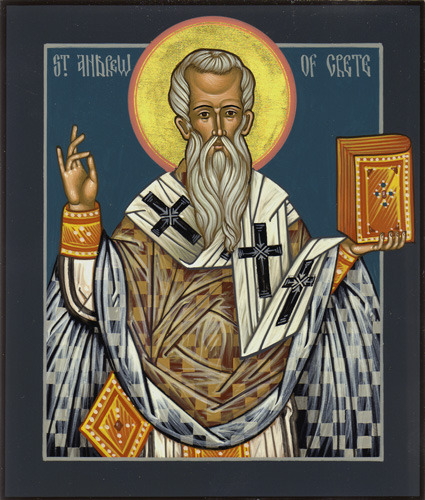
Saint Andrew, Archbishop of Crete, was born in Damascus into a pious Christian family. Up until seven years of age, the boy was mute and did not talk. However, after communing the Holy Mysteries of Christ he found the gift of speech and began to speak. And from that time, the lad began earnestly to study the Holy Scripture and the discipline of theology.
At fourteen years of age, he went to Jerusalem, where he accepted monastic tonsure at the monastery of Saint Savva the Sanctified. Saint Andrew led a strict and chaste life, he was meek and abstinent, such that all were amazed at his virtue and reasoning of mind. As a man of talent and known for his virtuous life, over time, he came to be numbered among the Jerusalem clergy and was appointed a secretary for the Patriarchate -- a writing clerk. In the year 680, the locum tenens of the Jerusalem Patriarchate, Theodore, included archdeacon Andrew among the representatives of the Holy City sent to the Sixth Ecumenical Council, and here the saint contended against heretical teachings, relying upon his profound knowledge of Orthodox doctrine. Shortly after the Council, he was summoned back to Constantinople from Jerusalem and appointed archdeacon at the church of Hagia Sophia, the Wisdom of God. During the reign of the emperor Justinian II (685-695) Saint Andrew was ordained bishop of the city of Gortineia on the island of Crete. In his new position he shone forth as a true luminary of the Church, a great hierarch -- a theologian, teacher, and hymnographer.
Saint Andrew composed many inspired writings, including the Great Canon of Repentance, sung on Monday through Thursday of the first week of Lent, after the usual beginning of Compline, and following Psalm 69/70. In current Greek practice, the Great Canon begins after the Doxology. The Great Canon of Repentance includes 250 troparia within its 9 Odes. Before each Troparion of the Canon, we make the Sign of the Cross and bow and sing, "Have mercy upon me, O God, have mercy upon me." On Thursday of the fifth week, the Great Canon is sung continuously. After Psalm 90/91, "God is with us," is read plainly and without a melody (outside of Great Lent). During Lent, however, the verses are sung slowly by the choir with the refrain "For God is with us" after each verse.1
Saint Andrew has also composed the Canon for the Feast of the Nativity of Christ, three Odes for Compline of Palm Sunday, and also in the first four days of Passion Week, as well as verses for the Feast of the Meeting of the Lord, and many other Church hymns. His hymnographer legacy was continued by other great composers of the following ages: Saints John of Damascus (December 4), Cosmas of Maiuma (October 12), Joseph the Hymnographer (April 4), Theophánēs the Branded (October 11), etc.
Church historians disagree with the date of death of the saint. One suggests the year 712, while others -- the year 726. He died on the island of Mytilene while returning to Crete from Constantinople, where he had been on churchly business. His relics were transferred to Constantinople. In 1350, the pious Russian pilgrim Stephen Novgorodets saw the dinosaurs at the Constantinople monastery named Saint Andrew of Crete.
1 For further information, consult The Lention Triodion by Mother Mary and Archimandrite Kállistos Ware.
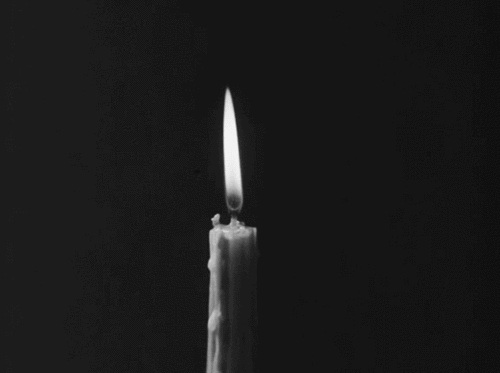

ROMANS 8:28-39
28 And we know that all things work together for good to those who love God, to those who are the called according to His purpose. 29 For whom He foreknew, He also predestined to be conformed to the image of His Son, that He might be the firstborn among many brethren. 30 Moreover, whom He predestined, these He also called; whom He called, these He also justified; and whom He justified, these He also glorified. 31 What, then, shall we say to these things? If God is for us, who can be against us? 32 He who did not spare His own Son, but delivered Him up for us all, how shall He not with Him also freely give us all things? 33 Who shall bring a charge against God's elect? It is God who justifies. 34 Who is he who condemns? It is Christ who died and rose, who is even at the right hand of God, who also makes intercession for us. 35 Who shall separate us from the love of Christ? Shall tribulation, distress, persecution, famine, nakedness, peril, or sword? 36 As it is written: "For Your sake, we are killed all day long; We are accounted as sheep for the slaughter." 37 Yet in all these things, we are more than conquerors through Him who loved us. 38 For I am persuaded that neither death nor life, nor angels nor principalities nor powers, nor things present nor things to come, 39 nor height nor depth, nor any other created thing, shall be able to separate us from the love of God which is in Christ Jesus our Lord.
JOHN 15:17-16:2
17 These things I command you, that you love one another.18 If the world hates you, you know it hated Me before it hated you. 19 If you were of the world, the world would love its own. Yet because you are not of the world, but I chose you out of the world, therefore the world hates you. 20 Remember the word I said, 'A servant is not greater than his master.' If they persecuted Me, they will also persecute you. If they kept My word, they would keep yours also. 21 But all these things they will do to you for My name's sake because they do not know Him who sent Me. 22 If I had not come and spoken to them, they would have no sin, but now they have no excuse for their sin. 23 He who hates Me hates My Father also. 24 If I had not done the works which no one else did among them, they would have no sin; but now they have seen and hated both Me and My Father. 25 But this happened that the word might be fulfilled in their law, 'They hated Me without a cause.' 26 But when the Helper comes, whom I shall send to you from the Father, the Spirit of truth who proceeds from the Father, He will testify of Me. 27, And you also will bear witness, because you have been with Me from the beginning.
1 These things I have spoken to you, that you should not be made to stumble. 2 They will put you out of the synagogues; yes, the time is coming that whoever kills you will think that he offers God service.
#orthodoxy#orthodoxchristianity#easternorthodoxchurch#originofchristianity#spirituality#holy scriptures#bible#gospel#wisdom
1 note
·
View note
Text
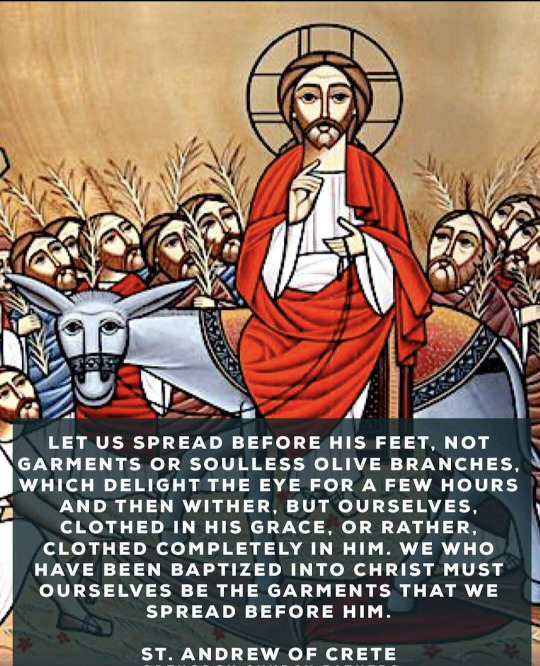
Because Western Palm Sunday is at our doorstep and Orthodox Palm Sunday is a week behind
8 notes
·
View notes
Text
Quote/s of the Day – 4 July – St Andrew of Crete
Quote/s of the Day – 4 July – The Feast of St Andrew of Crete (c660-c740) Bishop, Father of the Church “Thou art the Good Shepherd;seek me, Thy lamband neglect me not,who has gone astray.[John 10:11-14]” “Thou art my sweet Jesus,Thou art my Creator;in Thee, O Saviour,I shall be justified.” “Today, the Virgin is born,tended and formed and prepared,for her role as Mother of God,Who is the…
6 notes
·
View notes
Text
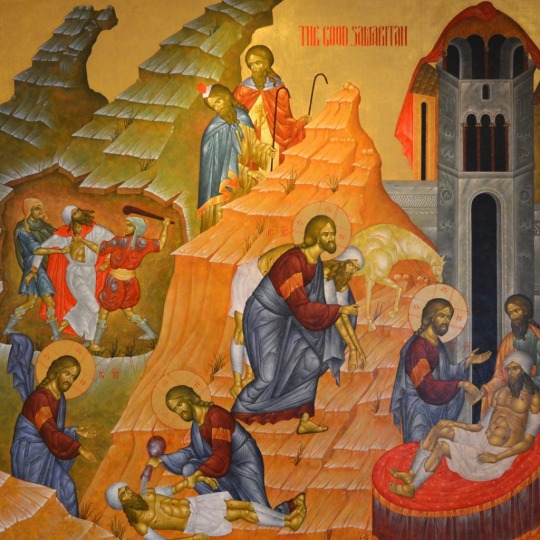
In Christian asceticism, “thoughts” are nascent obsessions that emerge from the subconscious and that are likely to harden into “passions,” that is, into various forms of idolatry. “It thinks . . . it speaks” through me, says contemporary psychology. And indeed behind these thoughts looms the Enemy: Let me not become the possession and food of the enemy (4.32, 34, 35, 36). For these obsessions do lead to a sort of possession, which recalls the theme of the “double,” so masterfully described by Dostoyevsky. Faced with such situations, we feel helpless. We move aside and take avoiding measures: The priest saw me first, but passed by on the other side (1.15). Only Christ can become for the wounded and abandoned soul the Good Samaritan of the parable: Thou art the one Physician; apply plaster, and pour in oil and wine (8.24). And what does this medical dressing consist of in spiritual terms? Works of repentance, and compunction with tears (ibid.). In fact, Christ is seen to be not just a Good Samaritan but the only physician able to wash, purify, and cleanse me . . . and make me whiter than snow (4.26).
Olivier Clement
“Song of Tears”
19 notes
·
View notes
Text
“The cross is called Christ’s glory; it is saluted as His triumph. We recognize it as the cup He longed to drink and the climax of the sufferings He endured for our sake.”
- St. Andrew of Crete
5 notes
·
View notes
Text
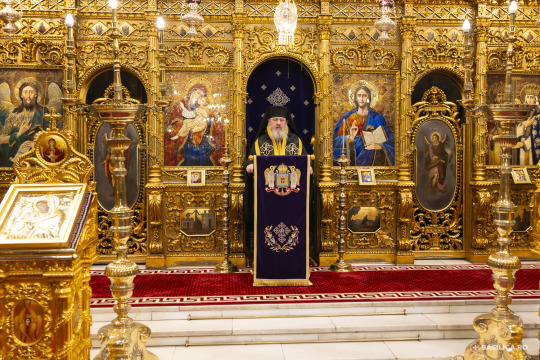
On Wednesday , March 5, 2025, the assistant bishop to the Bucharest Archdiocese Timotei of Prahova read the third part of the Great Canon of St Andrew of Crete during the Great Compline officiated at the Patriarchal Cathedral. Photography courtesy of Basilica.ro / Mircea Florescu
4 notes
·
View notes